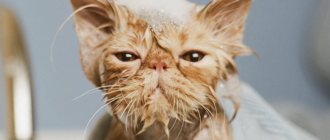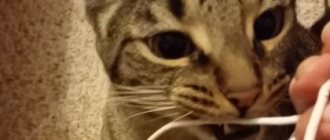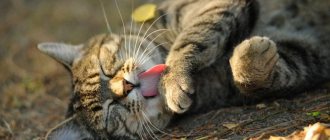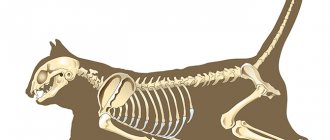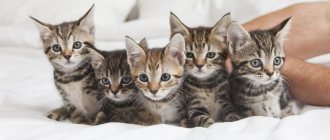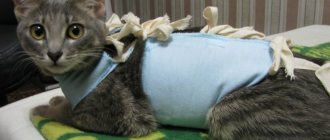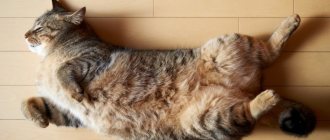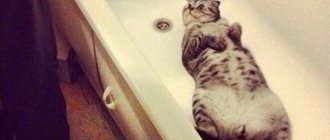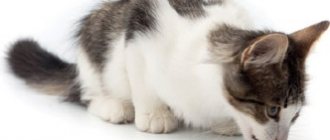Why does a cat yawn when he sees his owner?
- The average cat yawns once an hour.
- Most often after sleep and after stretching.
- But also at the sight of the owner.
- Is this a sign of disapproval?
When a cat yawns at you, it's easy to think that Her Majesty is just annoying you. Among people, such behavior is tactless, even rude. The “yawning” mouth should be carefully hidden so that the person nearby does not accidentally find out that you are bored. In the cat world, this behavior means something completely different. Cats yawn at their owners for many reasons. Get to know them all!
Energy storage
Yawning is, in fact, a complex bodily activity, the causes of which have not yet been established. One of them is the need for oxygenation (oxygen saturation). The blood becomes more saturated with oxygen and circulates faster, blood pressure rises and the number of heartbeats increases. The brain works better. It is a breath of energy for the body, a healthy and natural stimulation of action. In hypoxic blood, the concentration of carbon dioxide increases - so we can say that yawning protects against poisoning.
Cats use a similar yawn. They yawn for your well-being and so that they don't want to take another nap and spend some time with you doing activities and games.
Why is yawning contagious?
Not only humans, animals can also catch a yawn. There are many theories as to why this is the case.
- One of them says that this is a consequence of the fear of having enough air in the environment to breathe. When a person or animal sees someone yawning, they worry that the air is thin. The brain reacts immediately and takes in extra oxygen just in case.
- Another theory is imitation, which is inherent in all learning organisms.
Cats Yawn: Physiological and Psychological Basis
A yawn in a cat is an uncontrolled breathing process in which a slow, deep inhalation occurs and a rapid exhalation occurs. As a result, the blood is enriched with oxygen and brain function improves. Animal physiology and psychology will help you understand why cats yawn.
© shutterstock
Psychological yawning
A person yawning in a crowded place feels uncomfortable. Cats are the opposite: they yawn demonstratively to show their superiority and dominant position in a given territory. In films about wildlife, you can often see a lion lying in a clearing and yawning sweetly. By this he indicates to others their subordinate status.
In the process of yawning, a cat shows off its teeth and muscles.
Physiological yawning
The physiological basis of the yawning process is related to the need for oxygen to enter the body. So, a cat yawns:
- After waking up from sleep. When a cat sleeps, the whole body rests, processes slow down, including blood flow. Carbon dioxide accumulates. To saturate the brain and organs with oxygen, the cat yawns and stretches. As a result, the body's functioning returns to normal.
- In preparation for physical activity. Cats, like many predators, lie low, wait for prey, and then make a quick dash. The running speed of an animal directly depends on the work of the heart and the quality of oxygen saturation of the brain. Therefore, before making a jump, the animal yawns, feeding on oxygen, so that it can then quickly be used up.
- In the evenings. A cat's yawning in the evening does not mean that she wants to sleep. Cats are nocturnal predators. They sleep during the day and hunt at night. And the yawning of a cat is preparation for night life, for active actions.
Why does a cat yawn often?
A cat often yawns when it sees a person. However, try not to take it personally. The cat is not bored with you and this is not a gesture of hostility. Against! Only calm, well-adjusted cats who don't need to worry yawn casually. If they do this in your presence, take it as a compliment. You give your cat stability and security. This is one of the most important things you can give your pet besides delicious food.
Cats often greet us with yawns. When we get home, the pet seems to want to say “hi” to us, but at the same time seems sleepy and bored. Cats sleep most of the time when we are not at home. They only wake up when we return. And after you take a nap, you urgently need to show yourself to the world...
This is also proof that the cat is happy and he is glad that we are already here. He is glad to see us. Now he hopes for interaction.
How to get rid of yawning, recommendations
To stop your pet from yawning you need to:
1) Allow the animal to get enough sleep, that is, organize a daily routine.
2) Provide physical activity, namely, play more. The latter is easily achievable if you use special toys for cats , which allow you to use all muscle groups in the body of the mustachioed tabby.
3 Balance your diet. Food should be easily digestible
4) Try to reduce the number of stressful situations. If such problems occur, use special herbal preparations to relieve tension, fear, stress, allowing the four-legged animal to relax.
5) Be regularly examined by a veterinary specialist; in case of illness, carry out treatment measures in a timely manner.
Is yawning a sign of a health problem?
Most cat yawns are a natural part of the body's functioning or an attempt at communication. As with any behavior, if something happens too often and is not adaptive, it may indicate health problems. There are three possible explanations for an excessively yawning cat:
- Dental problems. When a cat yawns frequently, she may feel a toothache. Additional symptoms include drooling, bad breath, red gums and feeding problems. Intervention by a feline dentist will be necessary.
- Dyspnea. When your cat is breathing at an accelerated rate, panting heavily, making strange sounds while breathing, do not delay your visit to the veterinarian
- Hypercapnia . This is a condition in which there is too much carbon dioxide in the body. The still yawning cat is trying to remove the CO2 and replace it with oxygen. You may need urgent treatment.
Natural and forced yawning
Yawning is an involuntary action. The cat does not control the process. She yawns when the body needs to enrich the brain with oxygen.
The reason for yawning is lack of oxygen. You need to understand why your pet is yawning, and whether this is a sign of illness.
Natural causes
There are a number of natural reasons why four-legged animals yawn. These include :
- Yawning after sleep (discussed above).
- Stressful situations. During times of stress, a portion of adrenaline and hormones are released into the blood, putting the body on “combat readiness.” In this case, more energy is expended and oxygen reserves need to be replenished to maintain brain function. The animal yawns. A similar situation can be observed when the cat is, for example, at the veterinarian or in the car.
- Yawning after eating. Food that enters the body begins to be digested, and nutrients enter the blood and are distributed throughout the body, nourishing tissues and organs. To increase the speed of blood flow, the same oxygen is required, and the cat begins to yawn.
- It has been noticed that sometimes a cat yawns while looking at its owner when he yawns. The imitative reflex is triggered when everyone around begins to yawn.
© shutterstock
How often does a cat yawn?
- The average cat yawns once every hour.
- Definitely after sleep and stretching.
- When this happens much more often, it is worth carefully examining the cat.
If your cat yawns at the sight of you, it is most likely showing happiness in your presence. The cat is relieved to feel at home and communicates that he feels safe with you. However, keep an eye on your cat's behavior. Any behavior that deviates from the norm should attract our attention. If your cat spends more time yawning than she should, have her checked by a veterinarian.
See also: Why do cats sleep a lot?
When a cat yawns: what are the reasons for this phenomenon?
So, a cat has a yawn reflex in the following cases:
1) After sleep. When a cat sleeps , brain activity slows down. Blood flow slows down, brain activity slows down, and carbon dioxide accumulates in the blood. Accordingly, upon waking up, it is necessary to establish brain activity, so nature provided for yawning - a quick enrichment of the bloodstream with oxygen.
2) During times of stress. Stress leads to the release of harmful substances into the blood, which leads to a decrease in brain activity. Accordingly, to remove these substances, it is necessary to yawn tightly and, so to speak, relieve tension. You can observe a picture when a pet yawns due to stress, for example, in a veterinary clinic, when the four-legged dog is waiting in line with the owner to see a specialist. At this moment, the pet is surrounded not only by a lot of smells, but also by a new environment, which can easily confuse a pet that does not go outside.
3) After eating. To break down foods, part of the energy in the bloodstream is sent not to the brain, but to the digestive system, in order to ensure the breakdown of recently eaten food. The number of yawns at this moment increases in order to maintain brain activity at the desired level. It is worth noting that heavier cat foods that are poorly digestible cause more frequent yawning than easily digestible ones.
4) As a consequence of overwork. After a long trip somewhere in a carrier, your pet may simply get tired. Brain activity will be reduced. To restore it, the cat yawns reflexively.
5) Due to some neuralgic disease. If blood flow is disrupted and harmful elements are removed from the animal’s body, in particular the brain, the pet may yawn regularly. And if other symptoms or behavioral characteristics are observed, you can safely go to the veterinarian and look for the cause of the disease.
How cats and cats yawn
When yawning, a cat opens its mouth wide, the corners of its mouth are pulled back, its teeth are exposed, its tongue is extended and curled into a tube. At this moment, the animal’s eyes are tightly closed, its ears are pressed to its head, and the cat itself freezes for a few seconds. The inhalation is deep, and the exhalation is sharp and short.
If you compare the process of yawning in a cat with a human, they are absolutely identical. In this way, a cat, like a person, compensates for the lack of oxygen.
Yawning in cats is caused by the same reasons as in humans.
Video: cat yawns
Everyday Reasons for Frequent Yawning
Cats, like humans and other animals, behave in a similar way and begin to yawn under certain conditions:
- Stuffiness in the room. Increased humidity, temperature and lack of oxygen cause yawning to provide additional air.
- Confusion of the animal. In this state, a good yawn helps you quickly make a decision for further action. Again, this is due to the increase in oxygen concentration in the animal's blood and brain.
- Boredom. Against the background of this state, drowsiness increases, and yawning becomes the expected result of a lack of entertainment.
- The period after eating. For complete digestion, the body redistributes blood, resulting in most of it accumulating in the digestive system. Blood circulation in the brain decreases. Yawning helps compensate for oxygen deficiency.
- Physical fatigue. Yawning in this case means going to bed soon. A long rest will compensate for the loss of strength in the future, and the pet will wake up cheerful and active.
As you can see, yawning is not something inexplicable. All physiological processes in the body have a clear sequence and mechanisms to compensate for the listed conditions.
Owner's actions. In order for the pet to feel good, the owner must follow the recommendations of specialists:
- First of all, you need to let your cat sleep as much as she wants. You cannot intentionally wake a cat, even if it keeps you awake at night. There are more humane ways to solve this problem.
- During the daytime, you should pay more attention to your pet and play active games with it. This will not only allow the animal to release all excess energy, but will also strengthen the bond with the owner.
Whatever the innate instincts and habits of the mustachioed tabby, exercise during the day will ensure healthy and sound sleep at night.
Forced reasons
Yawning is always a lack of oxygen. The owner should be alerted by the pet's frequent yawning, state of apathy, lethargy. After all, yawning can be a sign of illness :
The consequences of diseases can be very serious, so it is not recommended to independently diagnose your pet and self-medicate.
Reasons why a cat yawns
The reasons why a cat yawns can be very diverse. But they are caused either by physiological reasons or psychological.
Natural causes
Natural causes of yawning in cats include all physiological and behavioral processes that require rapid enrichment of the body with oxygen.
After waking up
During sleep, your cat's metabolism slows down. The work of all organs proceeds in an energy-saving mode. The animal's body is relaxed. Oxygen consumption is reduced. When an animal awakens, it must quickly prepare itself. Dispel the fogginess of perception, put the muscles in order, because relaxation is the first enemy of any animal, as it threatens trouble. Stretching and yawning help a cat quickly restore the functioning of all parts of the brain and the body as a whole. Stretching warms up stiff muscles, increases blood circulation, and yawning provides an influx of oxygen.

